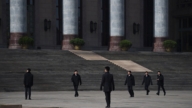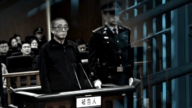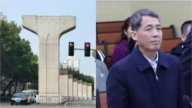【新唐人2013年01月29日讯】近年来,大陆当局相继设立了多个官员财产公开试点,并进行大力吹捧。但这些试点的进展却让各界深感失望。最近,广东省韶关始兴县官员财产公开再次蜕变为财产公示,只限政府内部公务员查询。有评论指出,中共官员贪腐严重,不敢公开真实财产。目前当局表面上说要公开财产,实际上是在给官员充分时间转移财产。
27号,广东省韶关市市委书记郑振涛在广东省人大会议上披露,此前被选定为官员财产公示试点的韶关始兴县,中国新年之后将对当地526名官员实行财产公示,但公示范围仅限于中共内部,通过内联网向公务员开放查询。
郑振涛表示,始兴县的财产公示包括工资、奖金、津贴、投资、房产和汽车6类。他宣称,经过一段时间公示之后,将适当的向社会公开。但这被网民质疑为,当局“打了半天雷就是不下雨”,在愚弄老百姓。
某央企广州总裁蔡先生:“很多官员都是多重身份,它(财产)根本不在自己名下。现在就没有办法去核实,而且没办法去监督这个东西。即使是这种所谓的公示,也是闹着玩玩的,没什么实质性的意义。”
时政评论员汪北稷也向《新唐人》分析指出,财产公示是中共自己在内部演戏,这种伪装出来的财产公示对人民没有意义。而真正意义上的财产公开在中共专制之下根本也没办法实现。
时政评论员汪北稷:“还需要有公正的独立媒体、独立的司法,才能够对财产公开那部分的真实性加以检验。所以中共即使公开也不愿意做,只做一个内部公示,这就是自我欺骗。”
汪北稷谈到,中共长期党政不分、公权私用,导致官员异常贪腐,中共权贵阶层的财富非常庞大,而且高速增长。社会矛盾随之急剧恶化,民众对官员财产公开的要求高涨。中共为缓解民愤,号称要推行财产公开,但实际上,即便是形式上公开,中共也不可能公开官员的真实财产数额。
汪北稷:“眼下中国大陆说的官员公开财产的舆论趋势,与其说是中共想要官员公布财产,倒不如说是中共在提醒它的大小官员赶紧转移财产。”
日前在广东省两会上,省人大代表叶鹏智别出心裁的建议,采取定期“摇号”的办法,让被选中官员公开财产。他理直气壮的辩解:“要官员公开财产有法律依据吗?官员也是人,也有隐私。”而在此之前,浙江省慈溪市纪委常委杨智峰则表示,目前官员和普通民众收入差距较大,官员财产网上彻底公示后,会引起社会反弹,带来不稳定。
对此,汪北稷指出,中国大陆的不稳定是由于中共的残酷统治造成的。实际上,不管中共官员公开不公开财产,大陆民众愤怒的火山都一定要爆发,而且会越演越烈。
汪北稷:“共产党自己也在溃败,所以我想这种基层官员是说的真心话,但是即使不公布(官员财产),也不能说去阻挡共产党要解体的趋势。这个趋势是必然的。”
据报导,从2009年开始,中国大陆已有29个市、县成为官员财产公开试点。但这些试点有的搁浅,剩下的则大多是仅限内部小范围公示,有的甚至只公示3天。
采访/刘惠 编辑/李谦 后制/君卓
Officials Declare Assets Only on Internal Intranet in China
In recent years, some places in China have been
chosen as pilot sites for officials to declare assets.
The Chinese Communist Party (CCP)
has given the news a high profile.
In reality, however, the public are deeply
disappointed with progress at these pilot sites.
Lately in Shixing County, Guangdong Province,
local officials assets are reported to have only
been declared on the regime’s intranet.
Commentators say that severe corruption makes
them fearful of publishing real information.
The CCP’s overt promotion of declaring assets is
actually giving officials extra time to transfer wealth.
On January 27, Zheng Zhentao, Party Chief
of Shaoguan, Guangdong Province,
spoke at the CCP provincial People’s Congress.
He said that Shixing County has been selected as
a pilot site for officials to declare personal assets.
The first declaration will cover 526
officials after the Chinese New Year.
However, the information will only be
published on the regime’s intranet.
Reportedly, Shixing officials’ internal publication
of assets will include wages, bonuses, allowances,
investment, real estate and automotives.
Zheng Zhentao alleged that after a period of time,
the practice will be exposed to the public in some way.
Netizens question whether this is just the
authorities’ lip service to fool the masses.
Mr. Cai (President of a State-Owned Enterprise
in Guangzhou): “Many officials have multiple identities.
Their properties actually aren’t under their own names,
so there’s no way to verify and confirm as a watchdog.
There’s no substantive meaning for
such internal asset declarations.”
Critic Wang Beiji calls it a show that is
performed inside the CCP system itself.
This disguised asset declaration doesn’t make any sense.
He says real officials’ asset declaration
will never be valid under CCP rule.
Wang Beiji: “Even if it declares the assets, the authenticity
still needs to verified by independent media and judiciary.
But the CCP has showed an unwillingness to do
it, and uses a trick of internal asset declaration. This is nothing but self-deception.”
Wang Beiji adds that lack of separation between Party
and government over a long period of time, as well as
abuse of powers, has bread unusual corruption in
officials, and a rapid wealth boom among the ruling elite.
These also caused a sharp escalation in social conflicts.
This has triggered growing public pressure
for officials to declare their assets.
In order to ease social tensions, the CCP
claimed to launch officials asset declaration.
Wang Beiji says that even if the CCP officials
declare assets in form, it won’t be real data.
Wang Beiji: “As for the progress of asset declaration,
I think it’s more appropriate to see it that the regime
is warning its officials to quickly transfer their properties.”
At Guangdong’s Two Sessions, Ye Pengzhi, a Deputy of
the local People’s Congress made an unusual suggestion.
That is, to set up a lottery system, and all officials
who are picked will have to declare their wealth.
Ye Pengzhi argued, “What’s the legal basis
for the officials to declare their assets?
Officials are also human beings and have privacy.”
Prior to that, Yang Zhifeng, a standing committee member
of the CCP Discipline Inspection Commission in Cixi,
Zhejiang Province, remarked on the asset declaration.
He said that due to the large income gap between officials
and ordinary citizens, a full disclosure of official assets
will spark a strong public backlash, triggering instability.
Wang Beiji comments that the CCP’s brutal
rule is the root cause of instability in China.
No matter whether officials declares assets or not,
China will see an explosion of public fury one day. This has already been fueled.
Wang Beiji: “The CCP’s collapse has started from
within, so I think the grass-roots official said a truth.
That is, whether it instigates asset declarations or not, the
trend of the CCP’s disintegration has become inevitable.”
Since 2009, 29 cities and counties in China have been
reportedly selected as pilot sites for asset declarations.
Some of them have been delayed.
For the remaining regions, officials’ wealth has only
been declared internally, and only for three days.






























